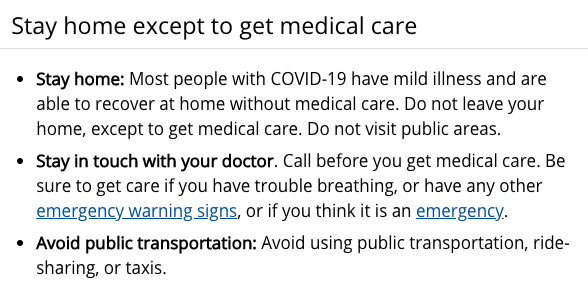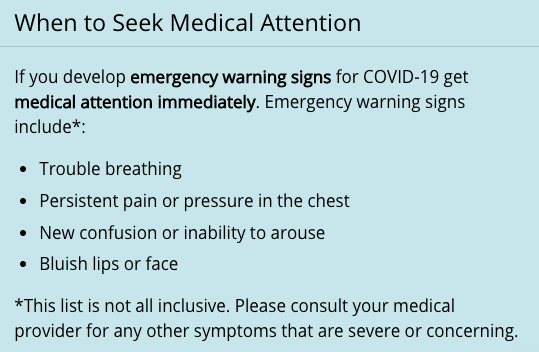Summary: This post contains advice from the CDC (Centers for Disease Control & Prevention), the most credible source I know, for people who can’t yet get the care we’d normally get from our healthcare system. Most predictions say there will be a lot of us in that situation soon if the system gets overwhelmed, and it’s always best to become informed before a crisis hits and you’re stressed.
A friend in the industry wrote this morning:
“I just talked to my daughter and she has fever and coughing and is very weak and nauseated and she can’t find anybody to test her. The labs said she has to have an order first. Her boyfriend works at [a chain store] and they had him working until recently. He came down with the symptoms first. I told her to call around to doctors until she can find one that’ll write an order for her.”
When you’re feeling scared and powerless, information can help. As video blogging doctor ZDogg said in my first coronavirus post, “The remedy for anxiety is knowledge and preparation.” He also said “We can be afraid but we will not panic.” In short, knowledge is power; if you’re feeling powerless, get some.
It can be fatal, but most people recover at home.
Here’s what the CDC’s “When you are sick” page says:
If you have a fever or cough, you might have COVID-19. Most people have mild illness and are able to recover at home. Keep track of your symptoms. If you have an emergency warning sign (including trouble breathing), get medical attention right away.
That “recover at home” link goes to their “caring for yourself at home” page, which is a short, clear set of to-do’s. Thanks to the CDC for keeping it clear and simple! There’s also a two-page printable color PDF that summarizes the whole site.
Do you probably have the virus?
What I hear from people in hospitals is that although it’s great to get tested, today’s tests aren’t perfect, and besides, there aren’t any treatments (unless you get so sick that you need an ICU). Most people recover at home. So, test or no test, if you have the symptoms, they treat you as if you have it – and you should act that way too. But here are a couple of ways to self-assess.
The “What to do if you’re sick” page has a pop-up self-checker “chat robot” you can use if you want. (See illustration)
My friend Debi’s MyLinks free personal health record product (PHR) has a simple self-assessment quiz too, which anyone can use.
Do you know of others? Please put them in a comment.
“Keep track of your symptoms”
Remember, most people (even the elderly) recover from this without hospitalization. But it does kill some people, and if you get sicker and need to be seen, it will be useful to have organized records. So it’s important to keep track of how you’re doing. Do this methodically, in an organized list: date & time, temperature, how bad your cough is, etc.
MyLinks is one PHR that has a symptom tracker: once you’ve created a login the tracker tool will keep your records organized and ready to show anyone. Again, it’s free. (If you know of others, please put them in comments.)
Here are some screen captures from the CDC site:
“Stay home except to get medical care.”
This is a screen capture so the links aren’t clickable, so I’ll capture that info below, too.

Note what this says: “Most people are able to recover at home without medical care.” Chin up! It’s no picnic, but keep doing the right things, and keep track of how it’s going. Besides, the ER and doctors’ offices are full of sick people, and besides, they don’t have any medicine to give you yet.
There’s a printable PDF with ten things to do, on the CDC’s Caring For Yourself At Home page.
Next screen capture:
Do you have COVID-19 danger signs?
It’s one thing to have symptoms, but how do you know if it’s trouble? Here are the signs:

Should you call 911?

(It’s ambiguous that they say to seek medical attention if you have the “emergency warning signs” above, but then say to call 911 if you have a “medical emergency”! Seems to me there should be some middle ground between those two. I’ll ask around for advice.)
How you’ll know when it’s over
Here’s my favorite part of the site: on the if you‘re sick page, scroll down to this —
Two other good sources …
Remember: the remedy for anxiety is knowledge and preparation. Two more resources:
- Here again is ZDogg’s terrific interview with his sixth grade daughter on YouTube Live, which I mentioned above. It seems like a lifetime ago but it was just two weeks (March 13). Even if you’ve seen it, watch again – it’s funny and informative. “Be prepared, not scared.”
- This week the excellent American Institutes for Research published this great five page PDF written in plain English – specifically eighth grade reading level, which is the recommended way to explain things so that everyone can understand.
Again, this virus is no picnic, but it’s not like there’s nothing we can do. Don’t believe rumors; stay informed as time goes by; don’t believe medical advice from non-medical people, including politicians and stock market analysts (they have their own axes to grind). Think carefully and do the right things.




Basically- Stay home unless you have shortness of breath- if you have a home finger oximeter use that and seek help if it goes down at all!
Hospitals really don’t have anything helpful to give you unless you need a breathing machine or can’t drink enough fluids.
Testing is so slow and backed up you should not go just for that at this point in my opinion.
The stress of the hospital visit to try to get tested will just make your illness worse!
Thanks so much for adding this, Patricia!
Great info as always, ePatient Dave.
Another free symptom tracker is doc.ai (app). You own your data, but if you give permission, the anonymized version can be used for clinical trials. Win-win.